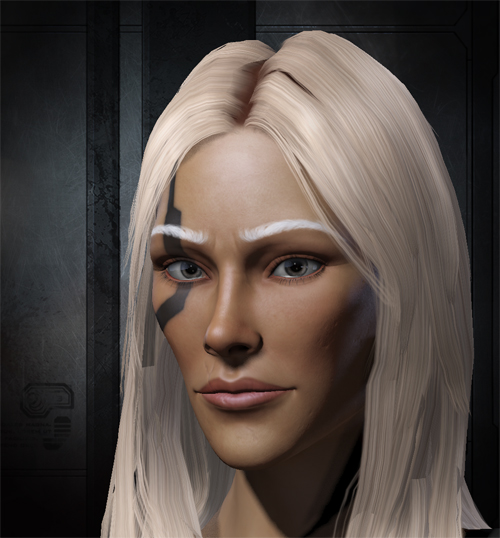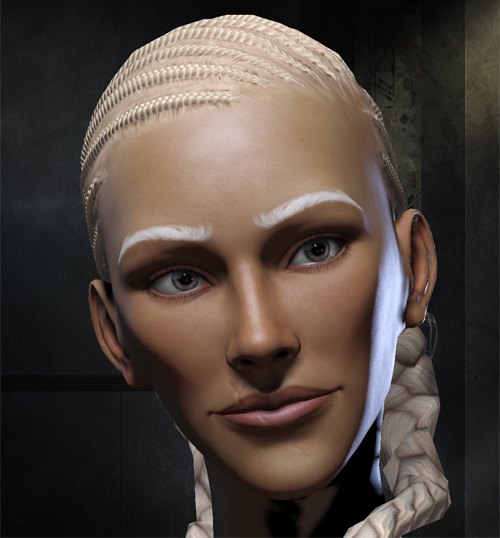My RP group has switched over to an original setting, which is a science fantasy space opera. This is a bit of background from it. I really like this piece, so I wanted to share.
(Kathil and Cerys, just before they meet again after the conclusion of this story.)
The Space Between the Stars
Cerys’s first memory is of her sister singing.
Kathil’s voice is rough, but strong, and she rocks Cerys in the dim light of the wee hours, in this tiny sterile room. Cerys is too young to know the words space station or research or clone. All she knows is that her sister is her guardian, and her comfort. Lorn’s breathing is sonorous where the imkedi sleeps next to the bed.
Cerys is three. Her next memory is of receiving her own imkedi cub when she is four.
#
Kathil braids Cerys’s hair for her, making neat rows that stay put even during low-grav exercises. Cerys hates having her hair braided. Kathil is too rough with her hair, trying to make sure that her fine white curls are tamed so they don’t obscure her vision in no-grav. Cerys sometimes cries, when her hair’s being braided.
“I want a braid like yours,” Cerys says. Kathil wears her hair in a single long braid that falls past her waist. “Can I?”
“When you’re old enough to do it yourself,” her sister says. She kisses the crown of Cerys’s head. “I’ll teach you, next time we wash your hair.”
Cerys would nod, but Kathil’s hands are hard in her hair. They hold her head still, finishing the braids.
Kathil doesn’t know how much she hurts Cerys sometimes. She’s too strong. Her fingers are too hard. Her feet are bruised and callused, her muscles and bones are hard like the walls and floors that surround them. Her eyes, too, are hard as metal, cold as the vacuum that surrounds them.
Cerys doesn’t understand why. Not yet. All she knows is that sometimes Kathil is soft and gentle, but those times are becoming more and more scarce.
#
“I want to be tall some day,” Cerys tells Kathil, one days after they’ve both done their high-grav exercise. Kathil is taking a break, stretching out her legs. She’ll go back to the barre for another three hours before the next meal, and Cerys will practice her music. “Like Tennant.” Tennant is so tall that the top of his head brushes doorways sometimes, when he’s not careful. He’s one of the scientists. He’s nice.
“We don’t get to be tall,” Kathil says. “We get to be small, instead.”
“Why?”
Kathil sucks in a breath. Cerys is seven, and seven is old enough to know things. Like the words clone and research and intergalactic. “Because small people need less oxygen, and fewer calories, and produce less carbon dioxide. And we’ve been changed so we need even less than a normal person our size.”
Kathil bends over her extended leg. Cerys studies her, studies her thin face and the corded muscle in her shoulders, her braid wrapped into a knot. They don’t have mirrors, or even reflective surfaces. Cerys has never seen her own face, but her big sister is like a mirror, only older. They’re clones. Special clones. Created for a very important purpose.
Most people don’t have purposes like they do. They are born and not created and decanted.
“When we fly between the stars, we’ll go together, right?”
Kathil stiffens, her long fingers curling around her calf. “I don’t know.”
Cerys thinks about the dark between the stars, and thinks that she needs her sister there. She’ll be too cold, all by herself.
#
Cerys is eleven when she finds out why her sister is so strong and so brittle.
They’re watching a vid, this one about farming practices on Honla. Cerys is fascinated. She’s never felt dirt, never seen a plant growing outside of the habitat at the center of the station. The idea that there are plants that fix nitrogen and plants that consume it is not new, but on such a scale–! Cerys is already planning her next essay comparing farming practices on Honla and Maqabim. At their feet, the imkedi snore, fanged mouths hanging open and three out of four eyes closed.
“Let’s go there,” Cerys says. “Wouldn’t that be interesting? We could see plowing, and maybe help harvest, like they’re doing there.” She points at the red combine that is threshing wheat.
“We can’t,” Kathil murmurs. She is tapping away at her screen, and Cerys steals a peek. More trajectories. She’s been working on harder and harder trajectories, complicated ones, ones that would take centuries to complete.
Cerys nudges her sister. “Why not?”
“They’d never let us.” They means the Illera Group, the people who run the station they live on.
“Why not? They want us to be educated, right? And enriched?” Going planetside would be plenty enriching, Cerys thinks.
“We don’t get to go anywhere the Group doesn’t want us to go.” She’s staring at the screen in her lap, her fingers tap-tap-tapping restlessly. “Especially not to a planet. There are laws against us a lot of places.”
Cerys frowns. “Maqabim, maybe, they don’t like anyone. But Honla has all kinds of laws about freedom of association…?”
“Those don’t apply to us.” Tap-tap-tap. “We’re clones. We’re not people. We’re property.”
She bites her lip. Looks at the vid where wheat is being stacked up in big silos. She has never seen a wheat grain. Or a silo. “We’re not things.”
Kathil puts her screen down and looks at Cerys. Then she wraps her arm around her shoulders and pulls her close. “I know that,” she whispers. “You know that. But the Group has a lot of money tied up in us, and if they don’t get a good return on their investment, they have the legal right to terminate the research project. Us.” She meets Cerys’s eyes, the darkness in them like the space between the stars. “Do you understand, Cerys?”
She understands.
From that moment forward, she is as good as she know how to be. She needs to be strong like her sister. She looks at pictures of the glittering stars and tries to swallow the cold between them down into her stomach.
#
She is at her keyboard, playing for Kathil, when she has the first vision.
They’re in the high-grav workout space. Cerys hates high-grav; it messes with her balance and makes her feel slow and stupid. But she loves to watch Kathil dance, and to play the music that wraps around the two of them and makes her sister fly.
It’s a kind of communion between them, the music and the dance. Cerys never feels closer to Kathil than when her music lifts her sister into the air, and when Kathil changes the music by dancing into it. They’re coming together, music and dance moving as one, and Kathil leaps into the air, executing a perfect grand jeté.
And then a screaming fills her head, and she sees fire. Nothing but fire. She tries to scrabble back, forgetting that she is sitting on a bench, and then she is falling and then—
Kathil’s face is hanging over hers. Cerys gasps, trying to catch her breath. “It’s nothing,” she says. “I was just daydreaming and my thoughts ran away with me.”
They both know she’s lying.
When it happens again, not two weeks later, Cerys knows they’re both in trouble. She can’t be unstable. That’s a bad word. A very, very bad word indeed. Almost as bad as the worst word.
Termination.
#
They’re lying face to face under the blankets. Cerys is exactly as tall as Kathil now, from nose to toes. She’s caught some of the researchers mixing up their names. They are identical as the moment that their zygote twinned, twenty-four years ago.
Cerys is fourteen, and she is terribly afraid that she will not make it to fifteen.
“Close your eyes,” Kathil says. “I want to try something.”
Cerys obeys. Her sister’s hands are cold on her head. I love you so much, she thinks, the words she never dares say aloud. I can love you enough for both of us.
There is a—tugging.
Something cold pulls at Cerys’s mind. Something dark and chill and patient. Something like vacuum, like the burned taste of space.
Let me have this, little sister.
And Cerys lets go, and falls into the white-hot heart of a star.
When she wakes, Kathil is gone. She leaves her imkedi behind, and Lorn’s anguished howls fill the station for standard weeks. Privately, Cerys agrees with him.
Outwardly, she is good. She is stable. The visions stop. But she has had lessons from Kathil. She knows how to hide certain activities in the endless calculation of trajectories. And she knows how to get through back doors into the comm systems of the station.
There, she sets up a web of agents, software informants looking for the subtlest of subtle cues. They wait, passively, for the scent of Cerys’s sister, any hint of her cold presence. She has to find her before they do.
Years pass.
When the news comes, it is from an old agent, one of the first Cerys set up. A med-comm agent, looking for seizures of certain kinds in the chatter between records storage and clinics.
It’s her.
Cerys doesn’t know how she knows, but she does. And more than that, she knows that the seizures are accompanied by terrible headaches. And that the seizures have been getting worse, and more frequent, and she is taking longer to recover from them.
This wasn’t yours to carry, Kathil.
She has to find her. Soon. Before what she stole kills her.
“It’s time,” she whispers to the imkedi, and begins to plan their escape.



